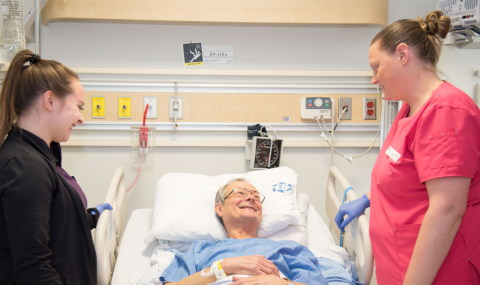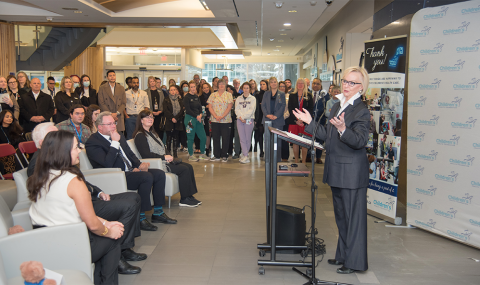MEDIA RELEASE
For Immediate Release
September 28, 2012
LHSC Recognizes World Rabies Day
LONDON, Ontario – LHSC’s emergency rooms receive approximately 4 visitors every day in the summer and 1 visitor every day in the winter to receive treatment for an animal bite. Many of these patients are concerned about rabies.
“Rabies is spread from infected animals to people by saliva. This could happen after an animal bite or scratch or by a contaminated animal’s saliva coming into contact with a cut or open wound,” says Dr. Gary Joubert, chief of emergency Medicine and Director of paediatric emergency medicine, LHSC. “If left untreated rabies is a fatal disease.”
Rabies is a slow moving virus that migrates from the point of the bite into the brain. The virus can take weeks or months to reach the brain depending on where the bite occurred.
Bats, skunks, raccoons and foxes are common rabies carriers. Animals with Rabies often act strangely. Dogs and cats, for instance, may become mean and bite or scratch for no reason. Some may become depressed and retreat to isolated places. While these behaviours may be present in a rabid animal, the reality is that it cannot be determined if an animal has rabies just by looking at it.
If bitten people should wash the area thoroughly with soap and water and call their family doctor or seek medical attention. “To treat rabies, patients can be given up to five shots over the period of 21 days,” continues Joubert. “The dosage of medication depends on a person’s body weight and the shot actively treats infection and provides passive immunity to rabies.” (more)
The first dose of the vaccine is often administered to patients in the emergency department; subsequent doses are then administered by a patient’s family doctor or a public health professional.
About London Health Sciences Centre
London Health Sciences Centre has been in the forefront of medicine in Canada for 137 years and offers the broadest range of specialized clinical services in Ontario. Building on the traditions of its founding hospitals to provide compassionate care in an academic teaching setting, London Health Sciences Centre is home to Children’s Hospital, South Street Hospital, University Hospital, Victoria Hospital, two family medical centres, and two research institutes – Children’s Health Research Institute and Lawson Health Research Institute, a joint research initiative with St. Joseph’s Health Care London. As a leader in medical discovery and health research, London Health Sciences Centre has a history of over 50 international and national firsts and attracts top clinicians and researchers from around the world. As a regional referral centre, London Health Sciences Centre cares for the most medically complex patients including critically injured adults and children in southwestern Ontario and beyond. The hospital’s nearly 15,000 staff, physicians, students and volunteers provide care for more than one million patient visits a year. For more information visit www.lhsc.on.ca
- 30 -
For media inquiries contact:
Marek Kubow
Corporate Communications and Public Relations
London Health Sciences Centre
519-685-8500, ext. 75155
marek.kubow@lhsc.on.ca
After-hours assistance:
Call LHSC Switchboard at 519-685-8500 and ask to page the communication consultant on-call
Visit the LHSC Media web site at www.lhsc.on.ca/media
Like us on Facebook at LHSC Canada, follow us on Twitter @LHSCCanada and watch us on YouTube at LHSCCanada.


